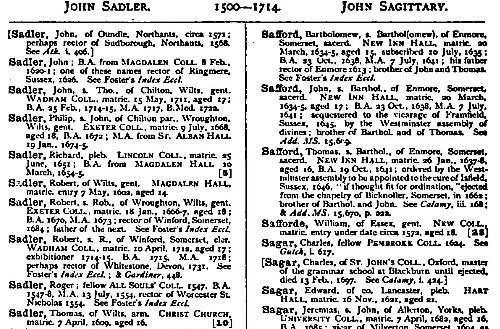English Genealogy in the 1500s
What You Need to Know:
• Oxford and Cambridge were the only universities in England until 1828. Therefore, you can concentrate your search for early academic records to these two institutions.
• Many people might assume they had no ancestors that attended either Oxford or Cambridge. However, for a variety of social and religious reasons, education was considered a necessary and reasonable form of enlightenment in the 1600s. Both universities experienced a massive increase in the number of undergraduate students beginning around 1600, which lasted to about 1650. Many middle class families sent at least one child to university during this period, particularly if they were destined to work in the Church of England. In fact, a greater proportion of young people attended university during this period of time than at any other period in English history until the 1950s. Therefore, it is worth looking to see if one of your ancestors attended either university.
• The Oxford alumni records include parentage, birthplace, year of birth (sometimes the exact date of birth), Oxford college attended and degrees.
• Some records also contain the date of death and brief biographical information (especially if your ancestor held a position in the Church of England).
• The list of records from 1500 to 1886 can be found online and searched for free. [Alumni Oxonienses 1500-1714] [Alumni Oxonienses 1715-1886].

• If you do manage to find an ancestor who attended Oxford University, be aware that Oxford has a long history of automatically awarding an MA (Masters of Art) after a couple of years to any student who successfully graduates with a BA (Bachelors of Art) and who maintains a "good character" after graduation. It does not mean that your ancestor was at Oxford between the time of the awarding of the BA and the automatic awarding of the MA a couple of years later.
• Ancestry.co.uk also maintains listings of Cambridge University alumni from 1261 to 1900. Access is by subscription. [Historic Cambridge Alumni Records]
What You Need to Know:
• The main types of records kept by clergy from this period are incumbent Visiting Books, Easter Books and Communicants Lists.

• Visiting Books (as the name implies) were used by clergy to record visits to people’s homes in their parish. They often record dates, names of members of the households and sometimes other useful details that would assist the clergy in their duties. This could include such things about their parishioners as occupations, literacy, births, marriages, etc., and occasionally even hand-drawn maps with small sketches of the houses in an area. It is important to note that visits by the parish priest often included visits to non-conformists since the Church of England was newly reconstituted (in 1534 King Henry VIII formally separated the Church of England from Rome).
• Easter Books and Communicants Lists are the closest England gets to a complete survey of inhabitants of an area before official censuses began in 1801. Basically, they are lists of all the full members of the Church of England from the age of majority (typically 16 years old, although the age varied somewhat over the years). Parish priests gave careful consideration to these lists because they received tithes from all full members at Easter time.
• Many of these early ecclesiastical surveys have not survived to the present and the few that have survived are usually not on the internet. However, it is always worth checking to see if any survived in the local parish of your ancestors.

